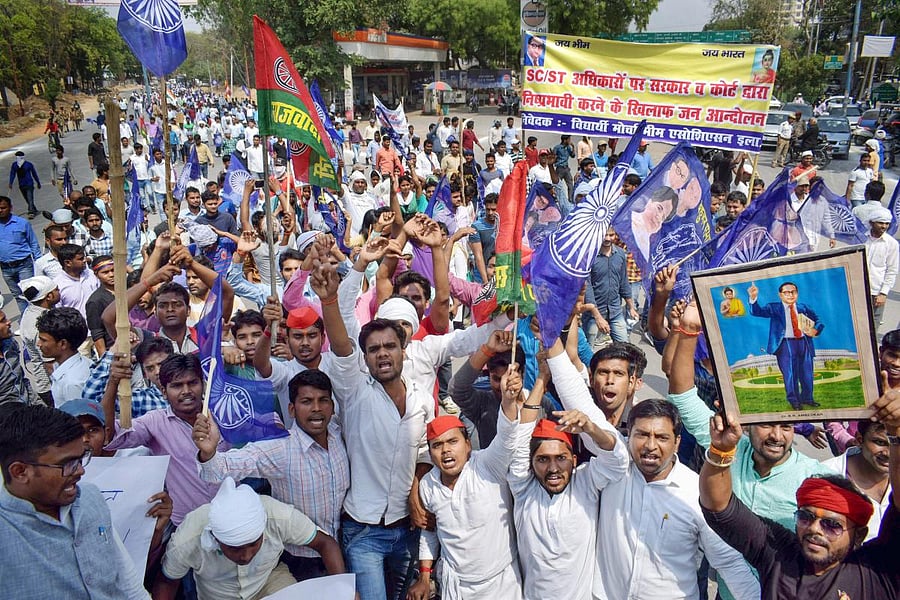
Every February 20 since 2009, the United Nations observes ‘World Day of Social Justice’ (WDSJ). The purpose is to take stock of the plight of injustice across the globe and to push for tenable solutions in mitigating the same. It recognises the need to alleviate the levels of poverty, social exclusion, reducing unemployment, addressing gender inequality, promoting effective participation in decision-making and access to opportunities and justice for all. Set in this context, it is pertinent to look into the aspects of justice in general and social justice in particular in India. The preamble to the Constitution promulgated justice broadly in terms social, economic and political aspects.
In ‘A Theory of Justice’, John Rawls identifies two “principles of justice”. First, “each person is to have an equal right to the most extensive total system of equal basic liberties compatible with a similar system of liberty for all”; second, “social and economic inequalities are to be arranged so that they are both (a) to the greatest benefit of the least advantaged, consistent with the just savings principle, and (b) attached to offices and positions open to all under conditions of fair equality of opportunity”.
To what extent our democracy has ensured justice to the historically socio-economic and politically alienated communities, in particular, and to its citizens, in general, needs to be understood. An attempt has been made to explore the nuances of social justice with specific reference to Adivasis (STs), Dalits (SCs) and Muslims. However, there are other communities that are continually denied justice, such as Other Backward Classes (OBCs), women, senior citizens, transgender people and youth.
The India Exclusion Report (IER) 2016 finds that the Adivasis, Dalits and Muslims are severely affected communities by way of exclusion from access to public goods. The first principle of Rawls’ justice is more of a theoretical stance or institutional arrangements that are necessary; the second is the practice of these rights and liberties. A decade ago, former vice president of India Hamid Ansari said that “for the 85 million Scheduled Tribes in India, the struggle to retain their identities and seek empowerment through our Constitutional framework has not yielded commensurate outcomes” and described the plight of adivasis as “unpalatable”.
Alienation of land from adivasis to non-adivasis through development projects, especially mining, in Scheduled Areas is causing displacement, migration and unrest among adivasi communities. Post-Independence, some 40-50% of displaced persons are adivasis.
Dalits are suffering the worst forms of social discrimination both within and outside government. As per the IER report, the extent of landlessness was highest among Dalits, at 57.3%, than among other social groups. This pushes them to work as daily wage labourers, mostly in agriculture, with inadequate and unequal pay. Due to the low wages, the condition of Dalit households is deplorable, which is a visible manifestation of the severity of the marginalisation. With regard to Dalits, ‘Caste, Discrimination and Exclusion in Modern India’ by Vani K Barooah et al (2015), has inferred, with irrefutable statistics, that “underpinning all forms of disadvantage is the practice of untouchability”.
Despite a rich history of shared living with mutual understanding and respect, the politics of religion and identity, especially between Hindus (majority) and Muslims (minority), has widened the social divisions in the country in the aftermath of the Babri Masjid demolition in 1992 and Gujarat riots in 2002. Mob and lynching attacks by extremist Hindu groups against minority communities, especially Muslims, has increased at an alarming rate since 2014.
The foregoing analysis and discussion clearly indicates the various forms of injustices in the form of land alienation of adivasis, social discrimination against Dalits and State-led violence and biased practices towards Muslims. What has been the role of the judiciary in protecting them from human rights violations?
The way the legal and criminal justice system operates has actually perpetuated and deepened existing practices. This observation can be corroborated from the fact of huge over-representation of Adivasis, Dalits and Muslims in Indian prisons. The glaring reality lies in the number of under-trial prisoners, most of them belonging to these excluded communities are forced to live in jails without any legal recourse.
Systemic ‘alienation’
The social exclusionary practices of the state and union governments towards the disadvantaged communities brings forth the concept of ‘alienated citizenship’ in India.
The alienation is an undercurrent in the formulation of public policies and related institutional arrangements, producing structural inequalities and violence, defective implementation of the existing programmes/schemes, inadequate budgetary allocations for social welfare and most importantly weak state and administrative capacities that are unable to deal sternly with the injustices and discriminatory practices.
Going back to Rawls’ principles of justice, what we can see in India is that despite progressive constitutional provisions, there is a constant denial of the rights of the historically marginalised sections.
Right to justice in all aspects of life is indispensable to building a just society. The practices of structural violence embedded in institutions of governance require an inward look by the Indian State which provides the critical inputs for inclusive policies. The question is whether the State lends an ear in order to strengthen democratic practices in day to day life?
The functional experience of a ‘modern nation-state’ shows that the Indian State is weak when it comes to resolving its own structural constraints and institutional deficits to restore the order. In the context of the persuasive power of neo-liberal policies through capital, the State’s role needs a radical transformation from an unjust to an ethical entity, as envisioned by Hegel. Without social justice, political democracy cannot sustain.
(The writer is PhD Fellow, Centre for Political Institutions, Governance and Development, Institute for Social and Economic Change, Bengaluru)